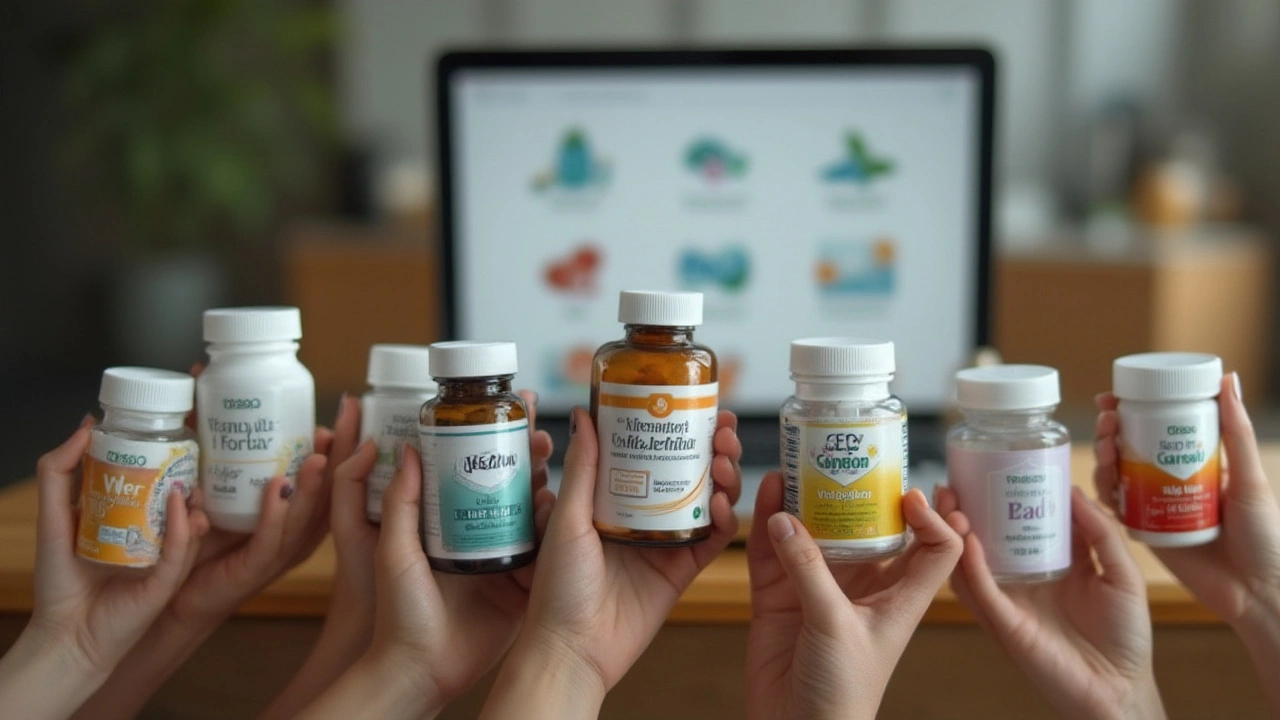Half your friends might pop a Vitamin D supplement, but do you really know where to get the good stuff online? With shelves clogged with capsules and internet searches spitting out pages of results, the simple act of buying Vitamin D often leaves folks confused or overwhelmed. That high demand isn’t just hype—about one in four adults struggles with low Vitamin D levels. Scientists have tracked the surge in interest over the past decade, fueled by links to immunity, mood, and bone health. No wonder you’re here, looking for tried-and-true ways to buy Vitamin D that’s actually what it claims to be.
Why Vitamin D Matters—and Why People Choose to Buy It Online
If you picture Vitamin D as just "the sunshine vitamin," you’re not wrong, but there’s a twist. While your body naturally creates it when sunlight hits your skin, most people—especially those in cloudy climates, people with darker skin, or folks who mostly work indoors—just don’t get enough from sunlight alone. A 2024 study in the British Journal of Nutrition found that nearly 35% of people in northern countries have Vitamin D deficiency during winter. Being short on Vitamin D can mess with your immunity, zap your energy, and even increase the risk for brittle bones. Plus, there’s buzzy new data showing links to mood and muscle strength.
So, why head online instead of buying Vitamin D locally? Online shopping gives you access to a broad spectrum of brands, strengths, and forms—including drops, capsules, and chewables—that aren’t always available at your nearest store. Shoppers gravitate toward the web for convenience, price comparisons, and reviews that can expose both gems and duds. (Ever tried hunting for a specific dose at 9 pm? Good luck in a drugstore—online’s always open.) And these days, online pharmacies and high-end supplement retailers are mainstream, not sketchy. Still, with more options comes more questions about safety, scammers, and which websites can be trusted.
How to Pick a Safe and Reliable Online Source
This is the treasure map part: the best sources to buy Vitamin D online are established, well-reviewed, and often accredited by organizations that monitor supplement quality. Big-store names like Amazon, iHerb, and Vitacost rule the market, mostly for their catalog size and buyer protection. But there’s a catch: platforms like Amazon are also home to third-party sellers—a mix of reputable brands and dodgy operations. So, which ones to trust? Go for listings sold and shipped by the retailer, not just the brand. Look for the words "Fulfilled by Amazon," or similar signals on other platforms.
Pharmacies with real-world storefronts—CVS, Walgreens, Boots—often sell supplements on their official websites. They might cost a little more, but you’re less likely to get a counterfeit. Niche vitamin retailers, like Swanson and PureFormulas, focus on certified products with clear sourcing. And for extra peace of mind, keep an eye out for third-party testing seals. USP, NSF, and ConsumerLab marks mean the supplement meets certain safety and purity standards. Scanning for these usually takes just a couple of seconds but can make a huge difference for quality.
One big red flag: be wary of "miracle cures," suspiciously cheap prices, or sites that don’t list contact info. And if an online shop asks for weird payment methods—like cryptocurrency or wire transfers—run, don’t walk, the other way. Here’s a handy cheat sheet for safe sites:
- Go with major retailers’ official online stores
- Look for third-party testing seals (USP, NSF, ConsumerLab)
- Read user reviews for red flags about product quality or delivery issues
- Check website transparency: legit companies show address and customer service options
- Avoid sites with sketchy promises or unclear policies

Different Types of Vitamin D You Can Buy Online
This is where the choices get overwhelming. The supplement world splits Vitamin D into two main types: D2 (ergocalciferol) and D3 (cholecalciferol). While both boost Vitamin D levels, D3 is typically more effective and is the form your body produces from sunlight. If you see the word "cholecalciferol" or a label saying "Vitamin D3," you’re in the right ballpark. Plant-based shoppers sometimes prefer D2, since it’s made from mushrooms or yeast, while D3 is often derived from animal sources—mostly sheep’s wool. But over the last couple years, vegan D3 options have hit the market. They’re usually labeled clearly as "vegan D3."
On top of that, there’s dosing to consider. A lot of folks buy 1000 IU tablets, but daily needs depend on factors like age, sex, and whether your doctor found you deficient. For reference, here’s a quick table with recommended average daily intakes, according to the US National Institutes of Health (as of 2024):
| Age Group | Recommended Daily Intake (IU) |
|---|---|
| Children 1–18 years | 600 IU |
| Adults 19–70 years | 600 IU |
| Adults 71+ | 800 IU |
| Pregnant/Lactating | 600 IU |
You’ll also notice Vitamin D supplements sold as tiny tablets, gummies, oral sprays, and even liquid drops. Tablets and softgels are classics—easy, cheap, and stable. Gummies taste good and are popular with people who hate pills, but watch out for sugar content. Liquid drops and sprays absorb quickly and are easy for kids or those with trouble swallowing. If you have allergies or are avoiding certain ingredients (like lactose, gelatin, or artificial colors), scan the ingredient list or filter for allergen-free options online.
How to Spot High-Quality Vitamin D Online
Even with a trusted website, you want to make sure what you’re buying is actually worth your money. First, check the "Supplement Facts" label—does it actually list Vitamin D as D3 (cholecalciferol) or D2 (ergocalciferol)? Is the dosage right for your needs? Avoid products that blend Vitamin D into "proprietary" mixes without clear amounts.
The manufacturing date and expiration are key. Vitamin D supplements lose potency over time. Most brands print the expiration date or best-by date on the product page online—if you can’t find it, it’s smarter to skip that seller.
Ingredients should be simple. If you see a parade of unnecessary colors, fillers, or mystery chemicals, move on. Third-party seals, as mentioned above, are a green flag—these labs test for purity, actual Vitamin D content, and contaminants like lead or pesticides. The best brands don’t hide reports: "Certificate of Analysis" (sometimes downloadable on product pages) show exactly what’s inside.
Here’s a quick checklist for high-quality Vitamin D online:
- Clear, easy-to-read ingredient list
- Labeled as D3 (cholecalciferol) or D2 (ergocalciferol)
- Expiration date posted
- Verification from USP, NSF, ConsumerLab, or equivalent
- Batch number or Certificate of Analysis available
Brands like NOW, Solgar, Thorne, and Nature Made rate high for transparency and consistent quality, based on 2024 customer surveys from Healthline and Consumer Reports. Expect shipping and delivery windows to vary—especially during winter months when demand spikes. Most big online shops also offer loyalty programs, discounts for subscribing, or bundled deals that can lower costs over time.

Tips for Smarter Shopping and Safe Use
Before you hit the buy button, check with your doctor or pharmacist, especially if you’re combining Vitamin D with prescription meds. Certain medications—like steroids, anti-seizure drugs, or weight-loss treatments—can lower your body’s Vitamin D or interact in ways that aren’t obvious. And remember, more is not always better with supplements. There’s a ceiling to safe daily intake: experts say adults shouldn’t regularly take more than 4,000 IU per day unless directed by a doctor.
After buying, store your Vitamin D in a cool, dry spot that isn’t the bathroom cabinet, since humidity can weaken the pills. Most people don’t realize direct sunlight can actually spoil vitamins—so go for a drawer or shelf. Mark the open date and peek at the pills from time to time: if they look faded, clumpy, or smell weird, toss them out.
One last thing: keep an eye on your body. If you start any new supplement routine—including Vitamin D—and notice nausea, headaches, or confusion, it’s worth checking in with your healthcare provider. Most people tolerate standard doses just fine, but toxicity from giant, unneeded doses is a real thing. If you want to check your Vitamin D levels, many telehealth services now offer at-home blood tests with results online, making it easier than ever to keep tabs on your health.


Rohini Paul
July 23, 2025 AT 16:07Been taking D3 from iHerb for 2 years now. No more winter fatigue. Just check the USP seal and you’re golden. No drama.
Courtney Mintenko
July 24, 2025 AT 02:53Everyone’s obsessed with D3 like it’s the holy grail but have you ever asked why the sun stopped being enough? Capitalism turned a biological need into a $20 bottle of lies.
Tiffany Fox
July 25, 2025 AT 06:11Just got my drops from Thorne last week. No gummies, no sugar, just clean D3. My energy’s back. Seriously, if you’re tired all the time, try it.
Khamaile Shakeer
July 26, 2025 AT 01:37Amazon? LOL. I got a bottle that said 'Vitamin D3'... turned out to be powdered chalk with a fake USP logo 😂. Always check the seller. Always.
Keith Avery
July 27, 2025 AT 16:57Let’s be real-the whole ‘Vitamin D deficiency’ narrative was pushed by supplement companies after the FDA stopped regulating dosages in 2007. Most people don’t need it. Your body’s been fine for 2 million years without a capsule. You’re not deficient. You’re just lazy.
And don’t get me started on ‘vegan D3.’ It’s a marketing scam. Mushrooms don’t produce cholecalciferol in meaningful amounts. It’s synthesized in a lab and labeled ‘natural’ because people pay more for that word.
USP? NSF? Those are just paid memberships. I’ve seen labs with those seals that failed independent testing. Trust your doctor, not a sticker.
And if you’re taking more than 1000 IU without a blood test, you’re not being smart-you’re being reckless. Vitamin D toxicity is real, and it’s silent.
Also, ‘Chewables’? Are you 5? This isn’t candy. It’s a hormone precursor. Treat it like one.
The real solution? Go outside. 15 minutes. No sunscreen. At noon. Your skin knows what to do. Stop buying into the supplement-industrial complex.
And yes, I’ve read the studies. The ones you cite are observational. Correlation isn’t causation. Wake up.
Natalie Sofer
July 28, 2025 AT 00:08Just wanted to say thank you for this guide-it helped me finally pick a brand without panic-buying. I used to get overwhelmed by all the labels. Now I just look for USP + D3 + no sugar. Simple. Also, I found a local co-op that ships with real tracking. So much better than Amazon.
ps: i spelled 'cholecalciferol' wrong in my notes like 7 times. sorry.
Cindy Burgess
July 29, 2025 AT 08:00The recommendation of 600 IU for adults is outdated. The Endocrine Society recommends 1500–2000 IU daily for maintenance, and the Institute of Medicine’s guidelines were based on bone health alone-not immune or neurological function. This article is misleading in its oversimplification.
Kevin Mustelier
July 31, 2025 AT 01:44So we’re all just supposed to trust ‘certified’ brands now? What’s next? Trusting the moon’s phase for dosing? 🌕
Every ‘trusted’ brand I’ve bought had a different potency than labeled. I stopped caring. I just take what’s cheap and hope.
John Kang
August 1, 2025 AT 18:59Found a great deal on NOW Foods D3 5000 IU. Took it for 3 months. My blood test went from 23 to 52 ng/mL. No side effects. Just clean, consistent, affordable. Do the math.
Holly Lowe
August 3, 2025 AT 10:38OMG I switched to liquid drops and my skin stopped looking like a dried prune. Like, literally. My glow is back. Also, I keep mine in the fridge now. It’s my little vitamin ritual. 🌿✨
Faye Woesthuis
August 4, 2025 AT 10:38Anyone who takes D3 without a blood test is a walking placebo. You’re not helping yourself. You’re just feeding the supplement industry. Stop.
Suryakant Godale
August 5, 2025 AT 04:37Respectfully, the assertion that D3 derived from lanolin is inherently unethical is a misconception. The extraction process does not harm sheep, and the yield per animal is minimal. Ethical sourcing is possible and verifiable through transparency reports. One should not reject a scientifically superior form due to unfounded assumptions.
raja gopal
August 6, 2025 AT 19:04My cousin in Delhi takes D3 daily. No sun, no doctor, just a bottle from a local pharmacy. She’s fine. Maybe we overthink this too much?
Samantha Stonebraker
August 8, 2025 AT 16:49It’s funny how we treat supplements like they’re magic pills when the real magic is sunlight, movement, and sleep. But hey-if a little D3 helps you remember to go outside, then maybe it’s not the supplement you need… it’s the reminder.
Simran Mishra
August 10, 2025 AT 01:28I started taking D3 because I was crying for no reason, and my therapist said maybe it’s not depression, maybe it’s deficiency. I bought the cheapest one on Amazon. The bottle arrived cracked. I cried again. Then I bought Thorne. Now I don’t cry anymore. I just sit by the window in the morning and stare at the sky like it owes me something. I don’t know if it’s the D3 or the silence, but I feel… lighter. Like I’m not broken anymore. Just tired. And now I take it with my tea. Every day. Like a prayer.
Sondra Johnson
August 10, 2025 AT 14:13Y’all are overcomplicating this. Buy D3 from a pharmacy you trust. Look for the seal. Take it with food. Don’t overdo it. And if you’re still unsure? Get your levels checked. It’s $30. Done. No philosophy. No drama. Just science.